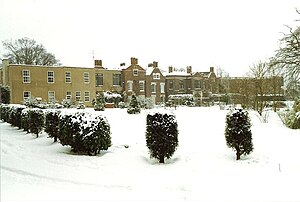Elston
| Elston | |
| Nottinghamshire | |
|---|---|
 All Saints Church, Elston | |
| Location | |
| Grid reference: | SK758479 |
| Location: | 53°1’24"N, -0°52’9"W |
| Data | |
| Population: | 631 (2011) |
| Post town: | Newark |
| Postcode: | NG23 |
| Dialling code: | 01636 |
| Local Government | |
| Council: | Newark and Sherwood |
| Parliamentary constituency: |
Newark |
Elston is a village in Nottinghamshire, to the south-west of Newark-on-Trent, and a mile from the A46, the ancient Fosse Way. It stands in the meadows between the rivers Trent and Devon, beside the smallere village of Syerston. The village is set amongst trees and farmland. Newark is five miles to the north and Lincoln and Nottingham some 18 miles north and south-west respectively.
The population of the civil parish taken at the 2011 Census was 631. A number of new homes have been built within the last twenty years on once open spaces and there continues to be infill development on some of the large gardens.
History
The square shape of the village is claimed to be is typically Anglo Saxon]]. It appears in the Domesday Book of 1086 as Elvastun.
Historic old buildings in and adjacent to the parish include Elston Hall, All Saints Church, the Old Chapel of Ease on the site of a mediæval leper hospital, the Methodist Chapel, and Elston Towers, the Victorian mansion of preacher Robert Middleton, now refurbished as a day spa and renamed Eden Hall.
According to Cornelius Brown's 1896 History of Nottinghamshire, the village lies:
"very snugly and prettily ensconced in the midst of a pleasing landscape of North England. Nearly opposite each other are the Hall and vicarage, both occupying delightful situations, and built in elegant and stately style. All Saints' Church, Elston has been handsomely restored, and is singularly rich in its memorials of the Darwins. This eminent family appear to have come to Elston from Lincolnshire towards the close of the seventeenth century, the manor being brought into the possession of William Darwin through his marriage with the heiress of Robert Waring of Wilford. William had two sons, and Elston was left to Robert, the younger, in whom the taste for scientific research began to develop."[1]
Aboutt he village
Elston Hall

Elston Hall was the home of the Darwin family from 1680 until just after the Second World War, when the estate was sold. Its premier resident was the savant Erasmus Darwin, grandfather of Charles Darwin. Erasmus founded the Lunar Society, which included Josiah Wedgwood, Matthew Boulton, James Watt, Joseph Priestley and Benjamin Franklin.
The present house was begun in 1756, then extended in 1837 and again later that century and in the 1950s. Originally H-shaped, it is now a linear sequence of two-storey ranges, the earliest being the central range built in blue lias stone. Grade II listed in 1952, the buildings are now divided into ten residences.[2]
Elston Chapel
- Main article: Elston Chapel

Once a parish church, this was declared redundant in 1976,[3] and under the care of the Churches Conservation Trust. The chapel is a Grade I listed building, containing a fine Norman south doorway with zigzag decoration.[3][4]
Inside are layers of wall paintings.[4] It is thought it may have been the chapel of a mediæval leper hospital dedicated to St Leonard.[5][6]
Elston Mill
Maps show windmills on the north side of Elston Lane (SK756487) and south side of Mill Lane (SK760477). The latter was a tower mill built about 1844, the tower being bottle-shaped, with an increase in batter at the 3rd floor. Some renovation was done by Gash in 1919 and a new sail fitted by Wakes and Lamb of Newark for £74 in 1920. However, it was demolished in about 1940.
Outside links
| ("Wikimedia Commons" has material about Elston) |
- The Elston Heritage Project
- Parishes - Elston, in Thoroton's History of Nottinghamshire: Volume 1 (by British History Online)
References
- ↑ C. Brown, A History of Nottinghamshire (1896), p. 135.
- ↑ National Heritage List 1178435: Elston Hall (Grade II listing)
- ↑ Jump up to: 3.0 3.1 "Elston Chapel, Elston", Heritage Gateway website (Heritage Gateway, Institute of Historic Building Conservation and ALGAO)), 2006, https://www.heritagegateway.org.uk/Gateway/Results_Single.aspx?uid=1157196&resourceID=5, retrieved 25 November 2010
- ↑ Jump up to: 4.0 4.1 Churches Conservation Trust: Elston Chapel
- ↑ The Nottinghamshire Village Book: Elston – A Modern Description (The Nottinghamshire Federation of Women's Institutes and Countryside Books)
- ↑ Information on Elston from GENUKI